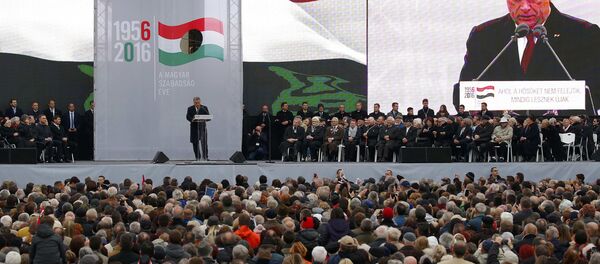In a rousing speech in Budapest at a ceremony dedicated to the sixtieth anniversary of the Hungarian Revolution, Orban took another shot at an EU bureaucracy already reeling from Brexit, a looming financial crisis, and the refugee crisis.
Insisting that EU member states must be given greater powers in relation to Brussels, the prime minister warned of a modern-day 'Sovietization' of EU policy, referring to the imposition of rigid EU rules on member states, in a manner similar to how the Soviet Union imposed its will on the countries of Eastern Europe during the Cold War. It's telling that he gave his speech on the anniversary of the Hungarian Revolution; 60 years ago, the Soviet army entered Hungary to suppress an anti-communist revolt.
Insisting that "we must close the border to stop the mass migration that flows from the south," the prime minister added that "we want to be a European country, and not merely a nationality in Europe." Budapest says it should have the right to introduce migrant quotas independently, and not have them "dictated" by Brussels. Otherwise, Orban warned, quotas could "radically change the cultural and religious identity of Europe."
Earlier this month, Hungary held a referendum on the issue of migrant quotas; 98% of those who took part in the plebiscite supported Orban's position in rejecting Brussels' quotas, but the vote's 43% turnout was insufficient for it to be recognized by the EU.
Orban's Sunday speech was greeted with cheers from supporters and jeers from opponents. Polish President Andrzej Duda, who was present at the event, expressed support for the Hungarian prime minister's policy and promised Warsaw's support.
Like Orban, who has engaged in numerous spats with Brussels and has been called a 'dictator' by EU Commission President Jean-Claude Juncker, Duda and Poland's conservative government have been facing growing pressure from the EU's top bureaucrats. Polish officials too have repeatedly called on Brussels to "stop meddling" in the country's internal affairs. As for Hungary, some EU officials have called for a tougher line against Budapest. Last month, Luxembourg's foreign minister said that Hungary should be temporarily or even permanently expelled from the EU over its stance on refugees.
Experts suggest that Orban's defiance, together with a series of crises plaguing the EU project, most importantly the continued fallout from the UK's Brexit referendum, may result in pressures which could ultimately collapse the EU. Just this past weekend, German Foreign Minister Frank-Walter Steinmeier warned that "the financial crisis, the refugee influx into Europe and the shock from the Brexit referendum in the UK have brought the European Union into violent turmoil."
Commenting on Orban's remarks and their implications for the future of the EU project, Institute of World Economic & International Relations Europe expert Yuri Kvashnin told the online newspaper Svobodnaya Pressa that while the EU is not quite the old Soviet Union, there are some superficial similarities, primarily as far as the concentration of decision-making power is concerned.
"When it comes to decision-making, there are several major countries that lead – Germany, France, Italy, and for now the UK, plus smaller countries with sufficiently large economies, like Poland, Spain and the Netherlands. Hungary is a small country; it has to maneuver, and faces being blocked by other countries," the analyst noted.
Furthermore, "the recent referendum demonstrated that the issue of migrants is vital to Hungarians. There are a lot of them, and Hungary is a transit country. While many travel to Germany and Sweden, some have to stay in Hungary. Now, border controls have been restored, and refugees cannot move on, and thus apply for refugee status in Hungary. Whether Orban is able to achieve what he's after remains unclear. But he must play for a domestic audience, demonstrating that he is defending the country's national interests."
Kvashnin suggested that whatever else happens, "Orban's latest statements, like his earlier ones, will certainly be heard in Brussels. After all, when Hungary joined the EU in 2004, Brussels' power was far more modest than it is today. Centralization began after the 2008 crisis. It was then that the flow of powers from the national level to the supranational took place. This applies to economic, immigration, and social policy; hence the discontent. Orban is explaining that Hungary did not sign up for this when it entered the bloc."
Only time will tell whether the Hungarian prime minister's sovereignty-minded approach will expand from calls for autonomy inside the EU to calls for a divorce from the bloc. One thing is clear: given all the other problems Brussels has on its plate, it certainly doesn't help to have Orban leading the charge in putting pressure on the bloc to account for the interests of its individual EU member states.





